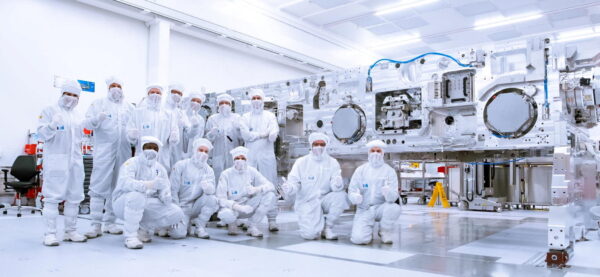US Tech Restrictions Curb China’s Military Ambitions
CommentaryWith the threat of U.S.-China military conflict looming, it is critical for the United States to cut off the People’s Liberation Army (PLA) from the technology the Chinese regime needs to conduct next-generation warfare. “The government’s prioritization of issues like climate change and woke gender ideologies over core national security interests gives Beijing reason for optimism,” wrote The Heritage Foundation in a recent report, calling on Congress to prevent the Chinese Communist Party’s (CCP) rise to world power. In mid-December, the U.S. government tightened restrictions, preventing PLA-linked companies from accessing advanced technology. In 2016, there were 249 Chinese companies on the Forbes Global 2000 list of the world’s largest companies. On the 2022 list, there were 351 China/Hong Kong companies. Over the past 40 years, China has transitioned from a poor authoritarian regime to a “totalitarian economic powerhouse,” according to The Heritage Foundation. To stop the CCP from achieving its goals of economic and military superiority, the U.S. Congress will need to increase legislation that prevents Beijing from obtaining the money and technology necessary to expand and modernize the PLA. U.S. legislation can be a powerful tool in the war against the CCP’s dominance. When the Trump administration first banned the sale of tech products to Huawei, the company slipped from being a national champion. Ripples of fear went out across the semiconductor industry. American chipmakers experienced pain, but the CCP was dealt a tremendous blow. In May 2019, top American chipmakers Intel, Qualcomm, and NVIDIA experienced a median revenue decline of 4 percent to 9 percent. Suppose the United States completely bans semiconductor sales to China. In that case, it is estimated that U.S. companies’ share of the global market could decrease by 18 percentage points while their revenues may decrease by 37 percent. While no one wants to see American companies suffering, American technology dominates the market, and the United States must be able to decouple its tech sector from China. The United States commands about 45 percent to 50 percent share of the global semiconductor market. The U.S. trade deficit with China is often in the news, but semiconductors are where the United States runs a trade surplus. China alone accounts for about 75 percent of semiconductors sold globally. Consequently, the CCP and the PLA heavily depend on the continued global supply of semiconductors. And if the United States can cut off that supply, the CCP and PLA will face a major setback. ASML employees pose in front of the partially completed frame of the company’s newest product in Veldhoven, Netherlands, in January 2022. (ASML/Handout via Reuters) New government regulations prohibit the sale of semiconductors necessary for developing artificial intelligence, supercomputers, and other next-generation technologies. Additionally, the scope of previous bans on selling equipment for advanced chipmaking to Chinese firms has been expanded. The bans have driven Apple to temporarily suspend its purchase of chips from Chinese firm Yangtze Memory Technologies Co. Similarly, Advanced Micro Devices reported that the restrictions would prevent it from exporting advanced AI chips called MI250 to China. U.S. authorities have also asked Japan and Holland to refrain from supporting China’s lithography technology. This includes preventing the Dutch chip equipment supplier ASML from selling its deep ultraviolet (DUV) lithography machinery to China. Advanced chips developed by companies such as Nvidia and AMD were particularly targeted by Washington as they can be used for AI and machine learning applications for natural language processing. Furthermore, these chips can be used to build training modules, bomb simulations, and design weapons for the military. The rules also prevent U.S. persons, both citizens and residents, from working in sensitive industries in China. By the end of October, at least 43 American senior executives worked in 16 publicly listed Chinese semiconductor companies. U.S. allies are also supporting the restrictions. Dutch equipment maker ASML Holding N.V. and other Western firms have suspended American employees awaiting further guidance from the U.S. authorities. The United States’ attempt to halt China’s domestic development of chips has become an arms race in the spheres of next-generation technology, AI, and supercomputing. Beijing has identified AI as a top strategic technology. Consequently, the CCP has been pouring money and state support into companies and laboratories doing research and development. Edison Lee, a Hong Kong-based analyst at American investment bank Jefferies Group, told the Bangkok Post that the U.S. chip ban, particularly advanced chips from Nvidia, would damage Chinese firms because there are no local substitutes. For this reason, China is expected to increase domestic funding for resear

Commentary
With the threat of U.S.-China military conflict looming, it is critical for the United States to cut off the People’s Liberation Army (PLA) from the technology the Chinese regime needs to conduct next-generation warfare.
“The government’s prioritization of issues like climate change and woke gender ideologies over core national security interests gives Beijing reason for optimism,” wrote The Heritage Foundation in a recent report, calling on Congress to prevent the Chinese Communist Party’s (CCP) rise to world power.
In mid-December, the U.S. government tightened restrictions, preventing PLA-linked companies from accessing advanced technology.
In 2016, there were 249 Chinese companies on the Forbes Global 2000 list of the world’s largest companies. On the 2022 list, there were 351 China/Hong Kong companies. Over the past 40 years, China has transitioned from a poor authoritarian regime to a “totalitarian economic powerhouse,” according to The Heritage Foundation.
To stop the CCP from achieving its goals of economic and military superiority, the U.S. Congress will need to increase legislation that prevents Beijing from obtaining the money and technology necessary to expand and modernize the PLA.
U.S. legislation can be a powerful tool in the war against the CCP’s dominance. When the Trump administration first banned the sale of tech products to Huawei, the company slipped from being a national champion. Ripples of fear went out across the semiconductor industry. American chipmakers experienced pain, but the CCP was dealt a tremendous blow. In May 2019, top American chipmakers Intel, Qualcomm, and NVIDIA experienced a median revenue decline of 4 percent to 9 percent.
Suppose the United States completely bans semiconductor sales to China. In that case, it is estimated that U.S. companies’ share of the global market could decrease by 18 percentage points while their revenues may decrease by 37 percent.
While no one wants to see American companies suffering, American technology dominates the market, and the United States must be able to decouple its tech sector from China. The United States commands about 45 percent to 50 percent share of the global semiconductor market. The U.S. trade deficit with China is often in the news, but semiconductors are where the United States runs a trade surplus. China alone accounts for about 75 percent of semiconductors sold globally. Consequently, the CCP and the PLA heavily depend on the continued global supply of semiconductors. And if the United States can cut off that supply, the CCP and PLA will face a major setback.

New government regulations prohibit the sale of semiconductors necessary for developing artificial intelligence, supercomputers, and other next-generation technologies. Additionally, the scope of previous bans on selling equipment for advanced chipmaking to Chinese firms has been expanded.
The bans have driven Apple to temporarily suspend its purchase of chips from Chinese firm Yangtze Memory Technologies Co. Similarly, Advanced Micro Devices reported that the restrictions would prevent it from exporting advanced AI chips called MI250 to China.
U.S. authorities have also asked Japan and Holland to refrain from supporting China’s lithography technology. This includes preventing the Dutch chip equipment supplier ASML from selling its deep ultraviolet (DUV) lithography machinery to China.
Advanced chips developed by companies such as Nvidia and AMD were particularly targeted by Washington as they can be used for AI and machine learning applications for natural language processing. Furthermore, these chips can be used to build training modules, bomb simulations, and design weapons for the military.
The rules also prevent U.S. persons, both citizens and residents, from working in sensitive industries in China. By the end of October, at least 43 American senior executives worked in 16 publicly listed Chinese semiconductor companies. U.S. allies are also supporting the restrictions. Dutch equipment maker ASML Holding N.V. and other Western firms have suspended American employees awaiting further guidance from the U.S. authorities.
The United States’ attempt to halt China’s domestic development of chips has become an arms race in the spheres of next-generation technology, AI, and supercomputing. Beijing has identified AI as a top strategic technology. Consequently, the CCP has been pouring money and state support into companies and laboratories doing research and development.
Edison Lee, a Hong Kong-based analyst at American investment bank Jefferies Group, told the Bangkok Post that the U.S. chip ban, particularly advanced chips from Nvidia, would damage Chinese firms because there are no local substitutes. For this reason, China is expected to increase domestic funding for research and development.
Chip restrictions are expected to curb China’s AI ambitions. High-end processors are critical for AI development. They are also used in next-generation weapons that the CCP plans to direct at Taiwan and the United States. Ignoring the threat that the CCP poses to the United States, Chinese officials have publicly complained about the chip bans, saying the United States is monopolizing the technology. At a press conference in September, Chinese commerce ministry spokesperson Shu Jueting said that the ban on Chinese imports of U.S. chips would threaten the global supply chains for other products.
Potential supply chain disruptions are a small price to pay for national security. Even more, a shortage of Chinese products and manufacturing inputs coming into the United States will encourage American companies to innovate and rebuild the American industrial base.
Views expressed in this article are the opinions of the author and do not necessarily reflect the views of The Epoch Times.












